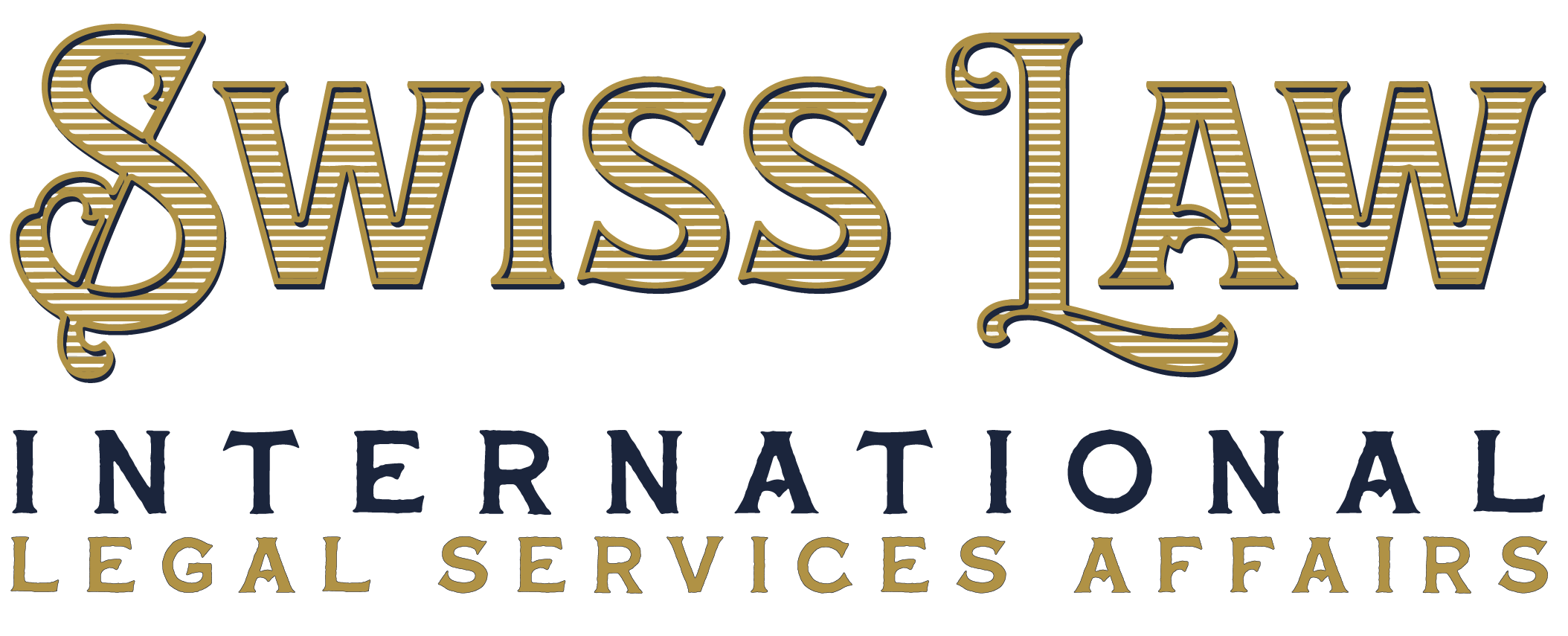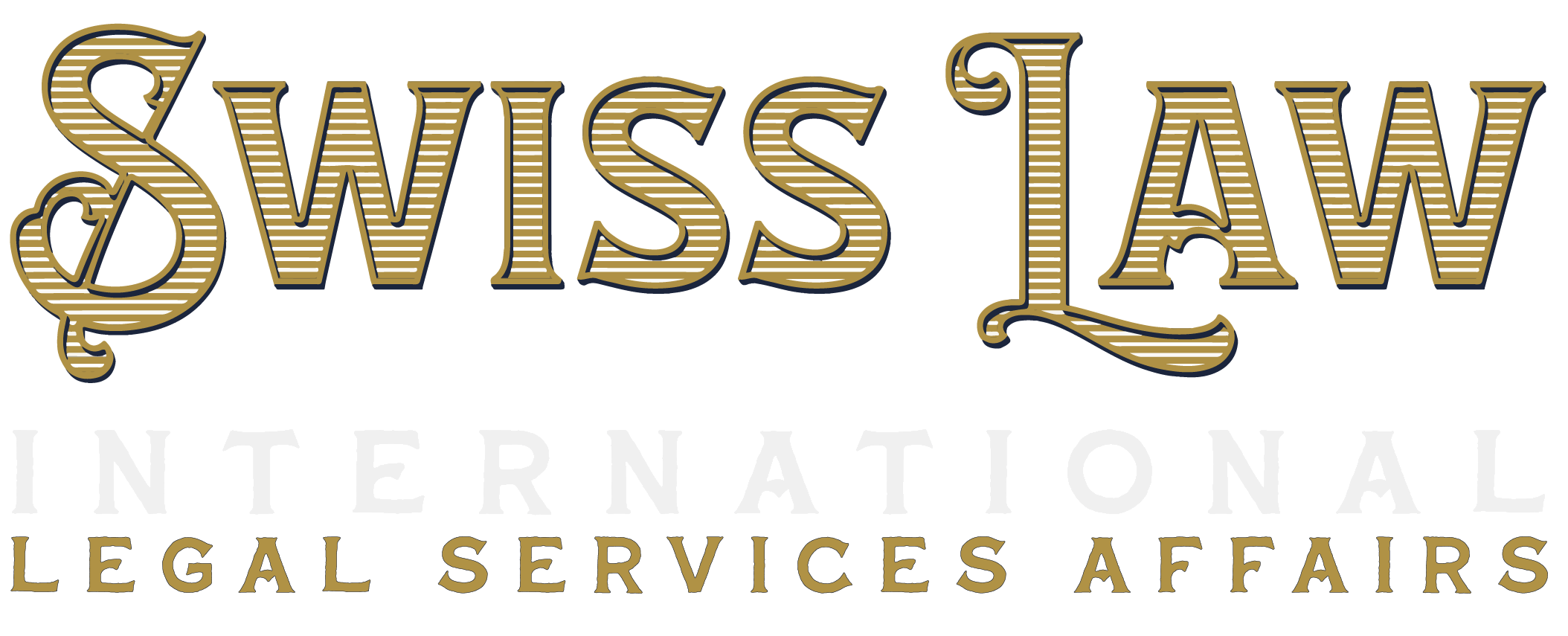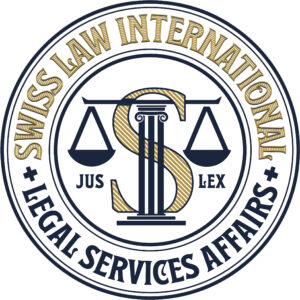QUEM NÓS SOMOS?
A empresa-mãe, SWISS LAW INTERNATIONAL OÜ, localizada na Estónia, assume total responsabilidade legal pela sua subsidiária, SWISS LAW INTERNATIONAL GmbH. A localização principal de nossa organização está situada em Navar Mountain 5, Central City, Tallinn, condado de Harju, na região de Eastland. O código postal associado a este endereço é 10117.
Somos capazes de fornecer suporte e orientação abrangentes relativos a diversas dúvidas e desafios jurídicos. Consequentemente, obtém-se assistência competente e familiariza-se com sucesso com as complexidades jurídicas da Suíça e da Estónia.
Nossa empresa estabeleceu escritórios em outros locais, incluindo Estônia, Zurique, Espanha e República Dominicana. Nossos serviços são convenientemente acessíveis em vários locais e possuímos experiência para oferecer suporte competente em vários domínios jurídicos.
A SWISS LAW INTERNATIONAL é uma empresa de consultoria jurídica com foco em assessoria e orientação jurídica. A assessoria jurídica baseia-se principalmente em Zurique, o direito administrativo da Suíça. Nossas áreas de especialização incluem direito de imigração suíço, aconselhamento jurídico, direito trabalhista, direito imobiliário, reestruturação de dívidas, aconselhamento jurídico em direito de família (separação e divórcio), direito penal, direito internacional público, direito privado, direito europeu e formação de empresas.
Nenhuma das atividades fraudulentas acima mencionadas ou mencionadas acima envolve SWISS LAW INTERNATIONAL. Esteja ciente de que não realizamos operações promocionais agressivas através de endereços de e-mail pessoais ou da Internet, como gmail.com, hotmail.com ou yahoo.com. Além disso, não costumamos fazer negócios por meio de mensagens de texto ou instantâneas. As ações ilegais de terceiros que usam o nome do SWISS LAW INTERNATIONAL indevidamente não são de responsabilidade do SWISS LAW INTERNATIONAL, de seus paralegais ou de sua equipe. Entre em contato com nossa equipe jurídica pelo telefone ou endereço de e-mail fornecido neste site se tiver alguma dúvida ou notar qualquer comunicação suspeita sobre o SWISS LAW INTERNATIONAL.
TERMOS DE USO:
SWISS LAW INTERNATIONAL (LLC) é uma organização de serviços jurídicos situada na Suíça que colabora com parceiros profissionais e membros fundadores (firmas-membro) com sede em Zurique. Seu objetivo principal é fornecer assessoria jurídica e outros serviços profissionais à sua clientela. As firmas-membro são estruturadas e administradas de acordo com os pré-requisitos locais, legais e regulatórios pertinentes. A designação SWISS LAW INTERNATIONAL é usada apenas por motivos descritivos e não deve ser interpretada como indicação de qualquer tipo de afiliação ou associação dentro de uma sociedade anônima de responsabilidade limitada entre as empresas constituintes. A delimitação da responsabilidade pelos serviços prestados aos clientes é estabelecida nas cartas de compromisso trocadas entre o membro e o cliente. De acordo com a linguagem frequentemente utilizada em organizações de serviços profissionais, as designações “sócio” ou “diretor” referem-se a uma pessoa que ocupa o cargo de sócio, diretor ou equivalente dentro de uma empresa associada. Da mesma forma, a palavra “firma” abrange qualquer firma-membro participante da organização. O site SWISS LAW INTERNATIONAL, administrado pelo escritório de consultoria jurídica ou por qualquer um de seus escritórios associados, serve apenas como fonte de informação. O conteúdo encontrado no site SWISS LAW INTERNATIONAL não tem como objetivo estabelecer uma relação paralegal-cliente ou qualquer outro acordo contratual, nem fornecer aconselhamento jurídico ou profissional sobre qualquer assunto.
A responsabilidade recai sobre o leitor de buscar ativamente a orientação de seu próprio representante legal. É altamente recomendável que os indivíduos se abstenham de tomar quaisquer decisões ou ações exclusivamente com base nas informações fornecidas no site do SWISS LAW INTERNATIONAL. Antes de tomar qualquer decisão ou ação, é essencial obter orientação de especialistas jurídicos ou profissionais relevantes. SWISS LAW INTERNATIONAL e suas firmas-membro não podem ser responsabilizadas por quaisquer perdas ou danos decorrentes do uso ou confiança no conteúdo fornecido no site SWISS LAW INTERNATIONAL. Além disso, isentam-se de qualquer responsabilidade por quaisquer ações ou omissões tomadas por clientes ou leitores em decorrência dos dados apresentados no(s) site(s) SWISS LAW INTERNATIONAL. Para qualquer dúvida sobre o conteúdo do SWISS LAW INTERNATIONAL, entre em contato com Juan Fabián, CEO. O site da SWISS LAW tem potencial para conter hiperlinks que levam a outros sites, enquanto esses sites externos também podem incluir hiperlinks que direcionam para SWISS LAW INTERNATIONAL. SWISS LAW INTERNATIONAL e suas afiliadas isentam-se de qualquer responsabilidade pelo conteúdo ou funcionamento de tais sites e não aceitam qualquer obrigação relativa ao conteúdo e funcionamento de tais sites externos. É possível que algum material encontrado no site SWISS LAW INTERNATIONAL possa ser considerado conteúdo promocional para um profissional jurídico, de acordo com os regulamentos estabelecidos pela organização de advogados relevante. Se for considerado relevante, a seguinte afirmação é formulada em conformidade com os regulamentos acima mencionados: Esta comunicação funciona como uma espécie de publicidade paralegal. As decisões anteriores nem sempre garantem um resultado comparável. Além disso, é aconselhável entrar em contato com o órgão regulador da área para obter mais detalhes sobre os negócios associados, além do referido aviso legal.
LUTA CONTRA A CORRUPÇÃO E A BUGLARIA
O SWISS LAW INTERNATIONAL é obrigado a aderir a uma ampla gama de legislações antissuborno e anticorrupção em diversas jurisdições. Especificamente, mas não apenas, a Lei de Práticas de Corrupção no Exterior dos Estados Unidos e a Lei Antissuborno do Reino Unido. O escritório, juntamente com seus advogados, colaboradores de seguros jurídicos e clientes, bem como seus prestadores de serviços, estão sujeitos a uma série de deveres de acordo com a legislação anticorrupção e antissuborno. Cumprimos essas responsabilidades e orientamos nossos clientes sobre a implementação de seus compromissos. Nossa organização implementou políticas abrangentes, programas de treinamento e protocolos operacionais para fazer cumprir com eficácia a legislação antissuborno e anticorrupção em escala global. Por favor, leia nosso Código de Conduta.
E-MAIL AVISO LEGAL
Informamos que se você recebeu um e-mail da SWISS LAW INTERNATIONAL, o conteúdo da mensagem de e-mail e quaisquer arquivos que a acompanham são destinados apenas ao destinatário e podem incluir informações proprietárias e privadas. Como resultado, qualquer pessoa que leia esta mensagem não é o destinatário pretendido nem um funcionário ou representante autorizado responsável por enviar esta mensagem ao destinatário pretendido. Esta pessoa também é avisada de que é estritamente proibido alterar, compartilhar, duplicar ou usar esta mensagem ou seus anexos de qualquer outra forma. Caso você tenha recebido uma mensagem inadvertidamente, é imperativo informar imediatamente o destinatário pretendido, respondendo à mensagem e removendo-a do sistema do seu computador. Esteja ciente de que fazemos análises automatizadas de todos os e-mails recebidos, tanto internamente quanto através de um provedor de serviços externo, para filtrar e-mails comerciais indesejados, também conhecidos como spam. Existe a possibilidade de um e-mail válido ser descartado erroneamente antes de ser revisado pelo destinatário pretendido dentro de nossa organização. Por favor, informe-nos se este filtro automatizado estiver causando algum inconveniente.
ESTA COMUNICAÇÃO OBJETIVA FORNECER UMA VISÃO GERAL DE CORREIOS ELETRÔNICOS E CHAMADAS TELEFÔNICAS FRAUDULENTAS RELATIVAS AO SWISS LAW INTERNATIONAL.
A SWISS LAW INTERNATIONAL é reconhecida como uma proeminente firma de advocacia e consultoria no sul da Europa e em todo o mundo, com uma força de trabalho substancial, incluindo vários profissionais jurídicos e funcionários vindos de diversos países. Lamentavelmente, as dimensões e a posição da nossa organização às vezes chamam a atenção de pessoas sem escrúpulos que falsamente alegam afiliação à SWISS LAW INTERNATIONAL e/ou usam a identidade da nossa empresa para perpetrar atividades injustas contra indivíduos inocentes. A Internet está repleta de casos de fraude e outros perigos à segurança. Consequentemente, é fortemente aconselhável que os indivíduos tomem medidas para salvaguardar o seu bem-estar pessoal e a confidencialidade dos seus dados. É nosso procedimento normal denunciar este tipo de irregularidade à polícia, mas a natureza e o alcance destas fraudes tornam impossível para a nossa empresa impedir completamente o uso ilegal da marca SWISS LAW INTERNATIONAL e das identidades dos nossos advogados. Vários comentários incorretos foram feitos recentemente sobre o SWISS LAW INTERNATIONAL. Houve casos em que indivíduos se apresentaram fraudulentamente como funcionários do SWISS LAW INTERNATIONAL, com a intenção de oferecer oportunidades de emprego ou solicitar informações pessoais e taxas de inscrição por e-mail. Estas atividades fraudulentas envolvem frequentemente a realização de “entrevistas online” através de plataformas como o Google Hangouts ou mesmo entrevistas telefónicas. Além disso, esses indivíduos podem alegar falsamente estar associados a uma empresa que utiliza SWISS LAW INTERNATIONAL como referência legal ou contato para fins semelhantes. Houve casos em que indivíduos se envolveram em atividades fraudulentas, apresentando-se fraudulentamente como funcionários da SWISS LAW INTERNATIONAL. Descobriu-se que estes indivíduos enviavam faturas fabricadas, acompanhadas de instruções fraudulentas de transferência bancária, com a intenção de enganar os destinatários para que efetuassem pagamentos. Houve casos em que alguns indivíduos se passaram de forma fraudulenta por advogados afiliados ao SWISS LAW INTERNATIONAL. Estes indivíduos foram vistos envolvidos em atividades de cobrança dirigidas aos clientes, incluindo táticas coercivas, como a emissão de ameaças para suspender ou impedir pagamentos até que o dinheiro urgente fosse entregue. Houve casos em que se descobriu que alguns indivíduos assumiram identidades fraudulentas como profissionais jurídicos afiliados ao SWISS LAW INTERNATIONAL. Sabe-se que estes indivíduos se envolvem em práticas enganosas, como a solicitação de transferências monetárias imediatas para o suposto benefício de um membro da família que sofreu um acidente automobilístico ou outro desastre imprevisto. Além disso, o indivíduo em questão foi visto enviando supostas notificações a órgãos judiciais, exigindo ação imediata. A enumeração fornecida acima não é uma compilação exaustiva de atividades fraudulentas, uma vez que os perpetradores concebem sempre novas estratégias. O site sofreu uma falha de segurança que permitiu que grupos do crime organizado manipulassem algumas páginas e inserissem textos sem autorização, incluindo as frases “Somos um escritório de advocacia” e “Somos advogados”. Depois disso, planearam iniciar um processo judicial contra o nosso partido, trazendo à tona as provas textuais que tinham escrito para nos fazer parecer culpados. A absolvição do Ministério Público foi concedida sob o argumento de que não podemos ser responsabilizados pelo material veiculado em nosso site. Esta vulnerabilidade surge devido à suscetibilidade destes sistemas à manipulação não autorizada por atores maliciosos, como hackers ou criminosos.
O QUE VOCÊ DEVERIA FAZER?
Para denunciar casos de fraude provável envolvendo e-mail, números de telefone ou outros assuntos relacionados, recomenda-se que os indivíduos procurem assistência das autoridades responsáveis pela aplicação da lei ou das autoridades administrativas locais apropriadas. No Internet Crime Complaint Center (IC3) do Federal Bureau of Investigation (FBI), tanto indivíduos quanto empresas nos Estados Unidos têm a opção de denunciar crimes cibernéticos, fraudes e crimes relacionados. Além disso, o site de reclamações da Comissão Federal de Comércio (FTC) serve como plataforma para relatar incidentes de roubo de identidade, fraude, burla perpetrada por vigaristas, bem como reclamações envolvendo dinheiro falsificado, entre outros assuntos. Uma série de recursos de informação relativos ao cibercrime podem ser acedidos dentro da União Europeia através da Autoridade Europeia de Polícia (Europol). On Guard Online oferece ainda orientação sobre como se proteger e denunciar possíveis casos de fraude online, bem como fornecer conexões para outros sites governamentais. Se alguém receber um e-mail ou telefonema ameaçador alegando ser do SWISS LAW INTERNATIONAL oferecendo emprego ou pedindo dinheiro ou informações pessoais, deverá entrar em contato com essa empresa.
- Certifique-se de que qualquer comunicação com este indivíduo seja realizada apenas através das informações de contato fornecidas em nosso site oficial, www.swisslaw.ch. Evite usar endereços de e-mail, números de telefone ou mensagens de texto alternativos para fins de comunicação. Caso o remetente utilize um endereço de e-mail que não seja originário do SWISS LAW INTERNATIONAL ou afirme que sua conta SWISS LAW INTERNATIONAL está enfrentando dificuldades, é imperativo que você enfatize firmemente a necessidade de se comunicar com o remetente apenas por meio dos dados de contato fornecidos em nosso website oficial.
- É aconselhável realizar o processo de verificação da conta, que pode incluir vários métodos, como a verificação telefónica, a fim de estabelecer a autenticidade da identificação do chamador. Uma abordagem eficaz pode ser comunicar-se com o advogado principal da empresa para confirmar a validade do chamador.
- É aconselhável não fornecer fundos monetários a ninguém que faça ligações ou envie e-mails.
- É aconselhável evitar divulgar informações pessoais ou financeiras, como detalhes de contas bancárias ou números de cartão de crédito, ao remetente de um e-mail ou ao chamador.
- É aconselhável denunciar imediatamente o correio eletrónico falso e contactar a polícia ou outras autoridades relevantes.
Além disso, é aconselhável tomar algumas medidas ao encontrar um e-mail potencialmente fraudulento que esteja diretamente associado ou pareça estar associado à nossa organização. Por exemplo, se você receber um e-mail de um endereço de e-mail SWISS LAW INTERNATIONAL “falsificado” que não termina com o “DOMÍNIO DE E-MAIL SWISS LAW INTERNATIONAL” designado, sugerimos implementar as seguintes diretrizes: É aconselhável evitar acessar ou interagir com quaisquer hiperlinks incluído dentro da carta eletrônica.
- É aconselhável evitar acessar ou baixar quaisquer anexos incluídos no e-mail.
- É aconselhável abster-se de responder ao e-mail ou divulgar quaisquer dados pessoais ou sensíveis.
- É aconselhável não remeter quaisquer fundos em resposta à carta eletrónica.
- Caso se considere necessário, é aconselhável encaminhar o correio eletrónico potencialmente duvidoso para o departamento de tecnologia da informação (TI) da sua organização e solicitar a avaliação da autenticidade da mensagem.
- Remova permanentemente a mensagem da sua conta de e-mail.
Caso você tenha dúvidas sobre a segurança do seu computador ou tenha suspeitas sobre possíveis comprometimentos de sua segurança, recomendamos entrar em contato com a equipe de suporte do departamento de tecnologia da informação da sua instituição, com o fabricante do seu computador ou com o seu provedor de serviços de Internet. . SWISS LAW INTERNATIONAL se isenta de qualquer envolvimento nas atividades acima mencionadas ou em quaisquer outras atividades fraudulentas. Ressalta-se que nossa organização se abstém de participar de empreendimentos comerciais assertivos por meio de plataformas de e-mail da Internet como gmail.com, hotmail.com, yahoo.com ou contas pessoais. Num contexto mais amplo, não é habitual realizar operações comerciais através de plataformas de mensagens de texto ou de mensagens instantâneas. SWISS LAW INTERNATIONAL e seus profissionais jurídicos e pessoal se isentam de qualquer responsabilidade pelas ações ilícitas cometidas por qualquer parte externa que se aproprie indevidamente da identidade da organização. Caso você tenha alguma dúvida ou encontre comunicações duvidosas relacionadas ao SWISS LAW INTERNATIONAL, solicitamos que você entre em contato com nosso conselho geral usando o número de telefone ou endereço de e-mail fornecido neste site.
DIREITOS AUTORAIS E REPRODUÇÃO
O SWISS LAW INTERNATIONAL, fundado em 2023, detém os direitos de propriedade intelectual deste documento, que é protegido por direitos autorais. A frase “Todos os direitos reservados” é frequentemente usada para indicar que o detentor dos direitos autorais retém os direitos exclusivos sobre a obra e que qualquer uso ou reprodução não autorizada é proibido. Os tratados internacionais de direitos autorais protegem o conteúdo do site SWISS LAW INTERNATIONAL. Não há problema em reproduzir grande parte do conteúdo do site, desde que (I) as cópias sejam públicas e sem fins lucrativos; (II) o crédito é dado ao SWISS LAW INTERNATIONAL; (III) as cópias não sejam alteradas ou apresentadas de forma que deturpe qualquer parte do conteúdo do site; e (IV) os administradores do site são informados sobre as reproduções. A autorização para criar cópias reversas não se estende à incorporação de uma seção significativa do site em qualquer obra ou publicação, independentemente do meio (impresso, eletrônico, etc.), ou para fins comerciais.








